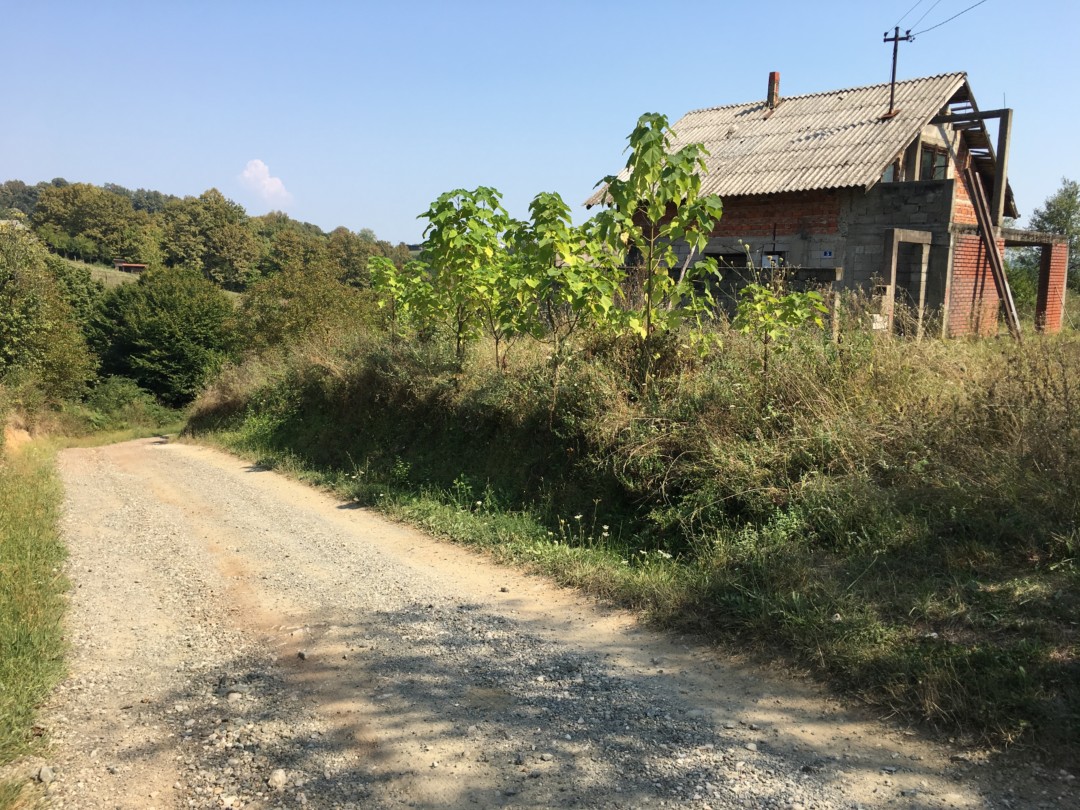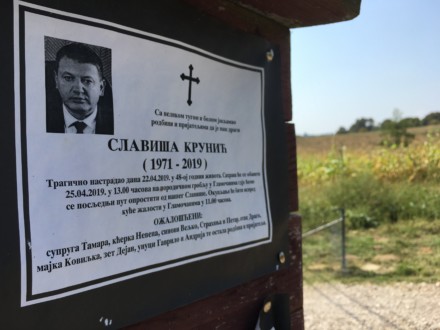22 April 2019
Banja Luka, Bosnia and Herzegovina
Slaviša Krunić
Profession
Private Sector
Motive
Exposure of illegal activity
Political dissent


Adolfo Olivas


Ahmed Divela


Amit Jethwa


Artan Cuku


Babita Deokaran


Bayo Ohu


Berta Cáceres


Bhupendra Veera


Bill Kayong


Boris Nemtsov


Boško Buha


Chai Boonthonglek


Charl Kinnear


Chut Wutty


Chynybek Aliev


Cihan Hayirsevener


Daphne Caruana Galizia


Darío Fernández


Derk Wiersum


Deyda Hydara


Édgar Quintero


Edmore Ndou


Edwin Dagua


Federico Del Prete


Fernando Villavicencio


Gezahegn Gebremeskel


Gilles Cistac


Habibur Mondal


Igor Alexandrov


Jacob Juma


Ján Kuciak


Javier Valdez


Joannah Stutchbury


José Ángel Flores


Jules Koum Koum


Kem Ley


Luis Marroquín


Mahamudo Amurane


Marcelo Rivera


María Elena Ferral Hernández


Marielle Franco


Milan Pantić


Milan Vukelić


Muhammad Khan


Nelson García


Nihal Perera


Oliver Ivanović


Orel Sambrano


Perween Rahman


Peter R. de Vries


Rajendra Singh


Salim Kancil


Sandeep Sharma


Sikhosiphi Radebe


Slaviša Krunić


Soe Moe Tun


Victor Mabunda


Virgil Săhleanu


Wayne Lotter


Yuniol Ramírez


Zezico Guajajara
22 April 2019
Banja Luka, Bosnia and Herzegovina
Profession
Private Sector
Motive
Exposure of illegal activity
Political dissent
On 22 April 2019, the deafening sound of multiple gunshots broke the calm of a still spring night at the property of one of Bosnia’s wealthiest and most beloved entrepreneurs, Slaviša Krunić.
Krunić, an outspoken Bosnian Serb who was known for defying local organized-crime bosses and their political backers, died that night in hospital. One of his attackers, a well-known organized-crime figure named Željko Kovačević, who had previously served a sentence for robbery, died on the spot. Krunić’s bodyguard, Žarko Pavlović, was also killed, and his driver, Goran Ilić, was seriously wounded.
The armed ambush, believed by police at the time to have been planned by Kovačević and three underground figures, two of whom were later arrested, took place near Krunić’s home in a suburban area of Banja Luka, Bosnia’s second city and de facto capital of the country’s predominantly Bosnian Serb entity, Republika Srpska.
By the next morning, the news of the 48-year-old father of four’s passing had spread sadness and outrage, including among his employees. He managed five companies and employed more than 3 000 workers.
Born in 1971 in then-communist Yugoslavia and raised by a police-officer father, Krunić learnt right from wrong at an early age. ‘He was a soldier by nature, precise, on time,’ one of his relatives told the author.
This deeply instilled sense of discipline is likely to have influenced his career path. After visiting Germany in the years following the bloody 1992–1995 Bosnian War, Krunić had the idea of starting a private security and protection agency, one of the first in Bosnia and Herzegovina. The concept was so groundbreaking at the time that a new law on security companies was adopted three years after Krunić started Sector Security in 1999.
In addition to being principled, Krunić was widely regarded as hardworking and someone who always gave more to people and society than he got back. His dedication to Banja Luka is perhaps most evident in his acquisition in 2014 of Žitoprodukt, a milling and baking business in Banja Luka that was struggling after the conflict of the early 1990s.
Žitoprodukt was more than just an investment for Krunić. He felt nostalgic for the time when Banja Luka was a bustling and picturesque part of Yugoslav life, and wanted to restore vitality to the city. ‘No one would have bought Žitoprodukt just to revive it, not for that price,’ said one of Krunić’s friends. ‘He always went for the harder way. For him it was an issue of pride; he nurtured this company.’
Krunić rose to popularity in the country when he said that he would offer jobs to people who used to work at Žitoprodukt before the war, or to their children. By doing this, he was advocating for the return of the many Bosniaks (Bosnian Muslims) who had fled the city during the war, some of whom had a hard time finding work in a city where Serbs form the majority.
‘Who can say today that coexistence is impossible in this country, that progress is impossible and that it [the country] cannot exist as it is?’ Krunić said in a television interview in late 2015. ‘In our company, there are workers who were on different sides in the war. They all honoured their own ethnic group, fought for their ideals but they realized in the end they have been cheated.’
Krunić had developed a similar ethos in how he staffed his security company, where he employed people who had fought against each other in opposing armies less than three decades earlier. ‘He was a good speaker and he could put together what others thought was incompatible,’ one of his close co-workers observed.
Krunić’s bold moves and brave outlook on life may have been appreciated by many in Bosnia and Herzegovina, especially his own workers, but they raised eyebrows among the political elite, who were winning elections on the back of a nationalistic narrative that divided citizens into three distinct ethnic groups. ‘He had his principles and that cost him,’ said his relative. ‘They could not bend his spine, so they had to spill his brain,’ added his co-worker.
As Krunić’s portfolio and the number of people he employed had grown, so had the pressure on him from people connected to organized crime, as he had complained publicly on many occasions. Even before the acquisition of Žitoprodukt, in a 2008 United States diplomatic cable published by WikiLeaks, Krunić was cited as allegedly making a complaint to the US embassy in Sarajevo against Milorad Dodik, a leading Bosnian Serb nationalist politician.

The road to Slavisa Krunić's property, where the murder occurred

According to Krunić, Dodik had ‘blacklisted’ Sector Security, preventing him from obtaining government contracts, a significant source of income for security companies in Bosnia and Herzegovina. Krunić also allegedly claimed that people close to Dodik were pressuring him to sell the company, as it was a direct rival to other private security companies believed to be connected to or owned by organized-crime figures or corrupt politicians.
But Krunić’s defining characteristic was his strength of will. And this, coupled with a strong sense of justice and his social conscience led him to defy ruling politicians – especially those with a nationalistic bent. He disagreed with them on almost everything, and especially with Dodik on how Bosnian Serbs should behave in Bosnia and Herzegovina.
Contrary to Dodik’s assertions that Bosnian Serbs in the semi-autonomous Republika Srpska owed their primary allegiance to neighbouring Serbia, a stance that prioritized their Serb connection, Krunić publicly promoted the idea that all people in Bosnia and Herzegovina are, first and foremost, Bosnians. ‘Bosnia and Herzegovina is our motherland and we have a duty to make it a better place to live. All of us,’ Krunić said in an interview.
Krunić also irritated political elites in more concrete ways, however. When a protest erupted in 2013, after a plan to build a skyscraper in a Banja Luka park was announced, Krunić sent his security workers to protect a family whose house was meant to be destroyed and who had been arrested and beaten. This added to the list of reasons why Krunić was under pressure and why his companies had stopped winning public tenders.
‘He felt abandoned by this [political] system,’ his relative said, a feeling Krunić himself described in an interview he gave in 2015. ‘I am Banja Luka born, but as such I became unfit,’ he said. ‘There were pressures to sell the company. I made a decision not to sell it to the people who are not part of the story, which is building this country, who do not mean well to the future of our children. And those are the ones we see in the political arena every day.’
As one in a series of unsolved, apparently politically motivated murders in Banja Luka, Krunić’s death has made his fellow citizens uncertain of their future. ‘With Slaviša’s death, the old Banja Luka is dying too,’ his friend said.
July 2022 update:
According to media reports, in July 2022, the district court in Banja Luka sentenced two accused, Benedij Đukanović and Rodoljub Gajić, to 40 and 20 years in prison in charges of ‘aggravated murder’ and aiding and abetting, respectively. Additionally, they were sentenced to pay €50 000 to Krunić’s family in non-material damages. A third accused, Emilio Baldo, was acquitted.


8 April 2017
Tirana, Albania
Artan Cuku


27 February 2015
Moscow, Russia
Boris Nemtsov


10 June 2002
Belgrade, Serbia
Boško Buha


19 December 2009
Bandirma, Turkey
Cihan Hayirsevener


16 October 2017
Bidnija, Malta
Daphne Caruana Galizia


18 September 2019
Amsterdam, Netherlands
Derk Wiersum


18 February 2002
Casal di Principe, Italy
Federico Del Prete


1 July 2001
Slavyansk, Ukraine
Igor Alexandrov


21 February 2018
Veľká Mača, Slovakia
Ján Kuciak


11 June 2001
Jagodina, Serbia
Milan Pantić


6 November 2007
Banja Luka, Bosnia and Herzegovina
Milan Vukelić


16 January 2018
North Mitrovica, Kosovo
Oliver Ivanović


15 July 2021
Amsterdam, The Netherlands
Peter R. de Vries


7 September 2000
Iași, Romania
Virgil Săhleanu